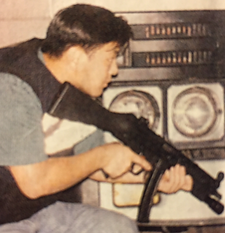
“If opportunity doesn't knock, build a door.”
-Milton Berle

When joining the "Royal Hong Kong Police," I embarked on my career in 1990 and planned to stay with the force until retirement. Life is unpredictable and so with new opportunities I decided to depart from the police force to pursue my American dream in 1998. I had not only served with pride but also enjoyed the camaraderie of police work with my peers. I learnt to be more flexiable because adaptability is the key to accomplish goals. I also learnt to be a careful listener and observer because attention to detail is important for invesigation. For their hard-work and sacrifice, I respect all members of law enforcement around the world, particularly police officers. Hats Off!







Brief History of "Royal Hong Kong Police"
The Hong Kong Police force was formally established in May 1844 after Hong Kong had been established as a British colony in 1841. Initially, the force had only 32 officers and rank and files consisting of Europeans, Indians, and Chinese. As the force grew in the later years, the ethnic groups of Hong Kong policemen became more diversified and included Europeans, Indians, local Chinese, Chinese from Shangdong Province, and White Russians. The very first female inspector joined the force in 1949 and the very first intake of women police constables joined in 1951. Before 1961, the responsibility of Hong Kong Police also included immigration, customs, and prison.
During the 10-month insurrection instigated by the leftists in 1967, the Hong Kong Police lost 10 men. Because of its effective and determined effort in quelling the riots and social unrest, the "Royal" title was bestowed to the Hong Kong Police force in 1969. Before 1974, corruption took place among almost all government departments including the police force. The practice of corruption was so common that it involved police officers of all ranks and ethnicities. With determination and wide-ranging powers, the Hong Kong government took the firmest and successful measures to eradicate syndicated corruption. As a result, the force was quickly rebuilt in a few years by removing powerful figures and destroying the corrupted culture. Successful education, effective anti-corruption campaigns, firm police internal management, and better emoluments all played a vital part in the reform. Due to its incorruption, professionalism, management, and efficiency by the end of the 1980s, the Royal Hong Kong Police was deemed "Asia's Finest" by many developed countries.
At the turn of the 1990s, the Royal Hong Kong Police gradually undertook the Hong Kong-China border patrol duty from the British Forces. During this time, the force also dealt with challenges that involved many heavily armed robberies, the expansion of the triads, and other organized crimes. Since the transfer of sovereignty to China on July 1st, 1997, the Royal Hong Kong Police reverted to its former name; Hong Kong Police after 153 years of service under British rule. With manpower of 34,000, the Hong Kong Police has since been responsible for the continuing service of the city and it's 7.5 million people.